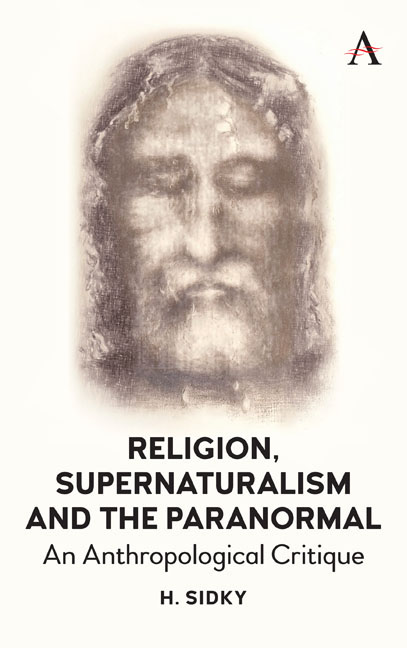Book contents
- Frontmatter
- Dedication
- Contents
- Acknowledgments
- Introduction
- Chapter One The Problem with Religion: Preliminary Issues
- Chapter Two The Unreal Real: The Supernatural, Religion, and the Paranormal
- Chapter Three Can Science Say Anything About Religion and the Supernatural?
- Chapter Four Ghostly Rappings, the Science of the Soul, and the Religious Nature of the Paranormal
- Chapter Five Ghostly Encounters in the Field: Anthropology of the Paranormal or Paranormal Anthropology?
- Chapter Six Why We Think the World Is Haunted
- Chapter Seven Cognitive Biases and Why People Think Eerie Thoughts
- Chapter Eight Miracles as Evidence of God's Actions in the World
- Chapter Nine When God Talks to People: Are Religious Experience Evidence of God?
- Chapter Ten Books Authored by God? Sacred Texts as Evidence of the Supernatural
- Chapter Eleven God's Fingerprints in the Natural World: Intelligent Design, Irreducible Complexity, and Cosmic Fine-Tuning
- Chapter Twelve The Miracles of the Bible: The Quintessential Foundations of Paranormal Beliefs in Western Culture
- Chapter Thirteen Jesus the Miracle Worker, Magician, and Sorcerer
- Chapter Fourteen Jesus's Empty Tomb, Missing Body, and Return from The Dead: Sources for the Paranormal Tale
- Chapter Fifteen The Post-Resurrection Appearances in the New Testament
- Chapter Sixteen Coping with Failed Prophesy: A Socio-Psychological Explanation for the Rise of Christianity
- Chapter Seventeen Conclusions: Why Religious and Paranormal Beliefs Persist and Their Dangers
- References
- Index
Chapter Seven - Cognitive Biases and Why People Think Eerie Thoughts
Published online by Cambridge University Press: 16 December 2019
- Frontmatter
- Dedication
- Contents
- Acknowledgments
- Introduction
- Chapter One The Problem with Religion: Preliminary Issues
- Chapter Two The Unreal Real: The Supernatural, Religion, and the Paranormal
- Chapter Three Can Science Say Anything About Religion and the Supernatural?
- Chapter Four Ghostly Rappings, the Science of the Soul, and the Religious Nature of the Paranormal
- Chapter Five Ghostly Encounters in the Field: Anthropology of the Paranormal or Paranormal Anthropology?
- Chapter Six Why We Think the World Is Haunted
- Chapter Seven Cognitive Biases and Why People Think Eerie Thoughts
- Chapter Eight Miracles as Evidence of God's Actions in the World
- Chapter Nine When God Talks to People: Are Religious Experience Evidence of God?
- Chapter Ten Books Authored by God? Sacred Texts as Evidence of the Supernatural
- Chapter Eleven God's Fingerprints in the Natural World: Intelligent Design, Irreducible Complexity, and Cosmic Fine-Tuning
- Chapter Twelve The Miracles of the Bible: The Quintessential Foundations of Paranormal Beliefs in Western Culture
- Chapter Thirteen Jesus the Miracle Worker, Magician, and Sorcerer
- Chapter Fourteen Jesus's Empty Tomb, Missing Body, and Return from The Dead: Sources for the Paranormal Tale
- Chapter Fifteen The Post-Resurrection Appearances in the New Testament
- Chapter Sixteen Coping with Failed Prophesy: A Socio-Psychological Explanation for the Rise of Christianity
- Chapter Seventeen Conclusions: Why Religious and Paranormal Beliefs Persist and Their Dangers
- References
- Index
Summary
It is the peculiar and perpetual error of the human intellect to be more moved and excited by affirmatives than by negatives; whereas it ought properly to hold itself indifferently disposed toward both alike.
—Francis Bacon, Novum Organum (1620)When men wish to construct or support a theory, how they torture facts into their service!
— Charles Mackay, Memoirs of Extraordinary Popular Delusions and the Madness of Crowds (1842)The influence of belief, on hypothesis, on perception is so striking that one might almost say, not seeing is believing, but that believing is seeing.
— Reuben Abel, Man Is the Measure (1976)Anecdotes are unreliable for various reasons. Stories are prone to contamination by beliefs, later experiences, feedback, selective attention to details, and so on. Most stories get distorted in the telling and retelling. Events get exaggerated. Time sequences get confused. Details get muddled.
— Robert Caroll, Skepdic (2007)Our memory of an event can be drastically changed if we later encounter new information about the event— even if the information is brief, subtle, and dead wrong.
— Theodore Schick and Lewis Vaughn, How to Think about Weird Things (2014)There is a close linkage between memory, thought patterns, human perception, and why we believe we have had supernatural and paranormal experiences and encounters. Some scholars have suggested that cognitive biases that distort perception and memory are at the foundation of many paranormal beliefs (Goode 2012: 296).
Memory, Cognition, and Supernatural and Paranormal Ideation
One such set of cognitive biases are “quick and dirty rules of thumb” called heuristics (see Kahneman 2011: 97– 195). These allow us to rapidly sift through messy, random, and ambiguous data and arrive at workable solutions. There are several such rules. The “representative heuristics” permit us to recognize patterns and categorize data by assessing the similarities between objects and events according to some common striking attribute. Thus, when trying to determine cause-and-effect relationships, we use such guidelines as “like goes with like” or “big events must have big causes.” Another set of rules is known as the “availability heuristics” and entail the tendency to use past examples or events that come to mind immediately to render judgments in a current situation, such as using a recently viewed paranormal television show to explain an anomalous event one has encountered (French and Stone 2014: 126).
- Type
- Chapter
- Information
- Religion, Supernaturalism, the Paranormal and PseudoscienceAn Anthropological Critique, pp. 147 - 172Publisher: Anthem PressPrint publication year: 2019



